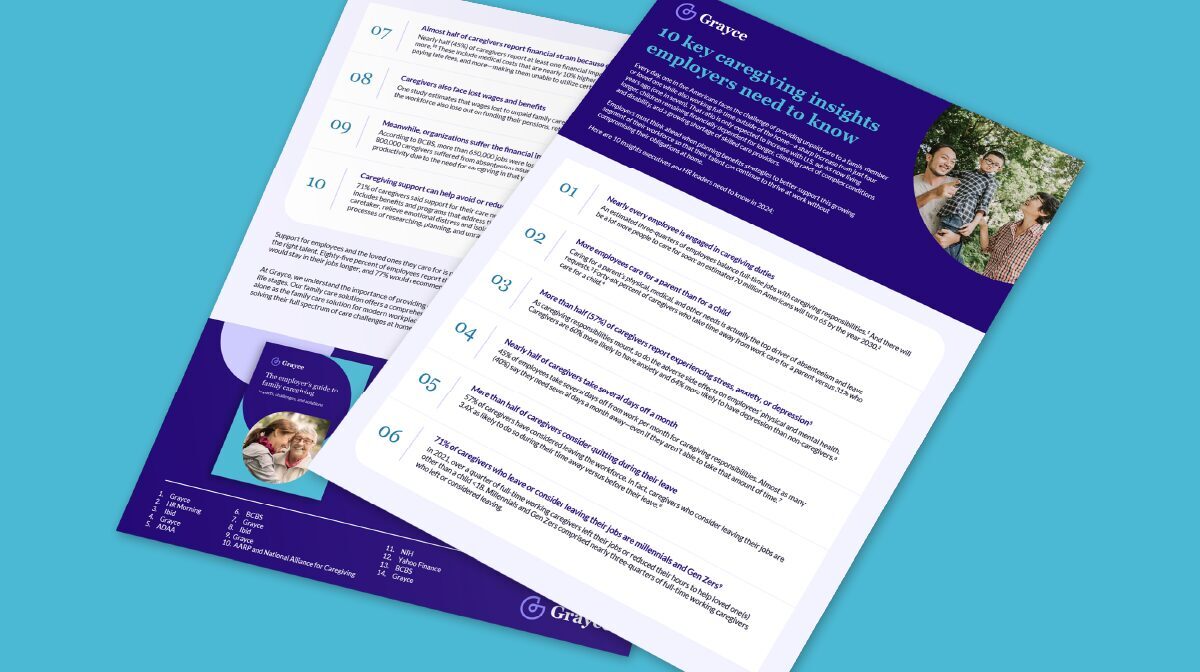The Value of Family Care Support
Learn how family care solutions like Grayce drive ROI for employers.
Learn how to support employees in balancing work and caregiving responsibilities.

Every day, one in five Americans faces the challenge of providing unpaid care to a family member or loved one while also working full-time outside of the home—a sharp increase from just four years ago (one in seven). That ratio is only expected to increase with U.S. adults now living longer, children remaining financially dependent for longer, climbing rates of complex conditions and disability, and a growing shortage of skilled care providers. Employers must think ahead when planning benefits strategies to better support this growing segment of their workforce so that their talent can continue to thrive at work without compromising their obligations at home. Start with these caregiving insights.
An estimated three-quarters of employees balance full-time jobs with caregiving responsibilities. And there will be a lot more people to care for soon: an estimated 70 million Americans will turn 65 by the year 2030.
Caring for a parent’s physical, medical, and other needs is actually the top driver of absenteeism and leave requests. Forty-six percent of caregivers who take time away from work care for a parent versus 31% who care for a child.
As caregiving responsibilities mount, so do the adverse side effects on employees’ physical and mental health. Caregivers are 60% more likely to have anxiety and 64% more likely to have depression than non-caregivers.
45% of employees take several days off from work per month for caregiving responsibilities. Almost as many (40%) say they need several days a month away—even if they aren’t able to take that amount of time.
57% of caregivers have considered leaving the workforce. In fact, caregivers who consider leaving their jobs are 3.4X as likely to do so during their time away versus before their leave.
In 2021, over a quarter of full-time working caregivers left their jobs or reduced their hours to help loved one(s) other than a child. Millennials and Gen Zers comprised nearly three-quarters of full-time working caregivers who left or considered leaving.
Nearly half (45%) of caregivers report at least one financial impact of caregiving; 34% said they experience two or more. These include medical costs that are nearly 10% higher,11 as well as reduced savings, taking on debt, paying late fees, and more—making them unable to utilize certain financial wellness benefits.
One study estimates that wages lost to unpaid family care could reach $147 billion by 2050. Caregivers who exit the workforce also lose out on funding their pensions, retirement plans, and other benefits.
According to BCBS, more than 650,000 jobs were lost in 2021 to caregivers exiting the workforce; another nearly 800,000 caregivers suffered from absenteeism issues at work. Organizations lost almost $44 billion in productivity due to the need for caregiving in that year alone.
71% of caregivers said support for their care needs would help avoid or reduce time away from work. Support includes benefits and programs that address the cost of care, facilitate the logistics of needing a physical caretaker, relieve emotional distress and isolation through community, and manage the time-consuming processes of researching, planning, and unraveling problems.
Support for employees and the loved ones they care for is not just a growing need; it’s an imperative for organizations to attract and retain the right talent. Eighty-five percent of employees report that they feel their needs are equitably supported with Grayce and that they would stay in their jobs longer, and 77% would recommend their employer specifically because they have access to Grayce. At Grayce, we understand the importance of providing comprehensive support for caregivers of all kinds—all diagnoses, geographies, and life stages. Our family care solution offers a comprehensive approach to creating a healthier, more resilient workforce. Grayce stands alone as the family care solution for modern workplaces, fostering peak performance and retention among employees worldwide by solving their full spectrum of care challenges at home.
Download list

Sign up to receive the latest resources and updates from Grayce.